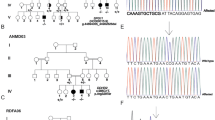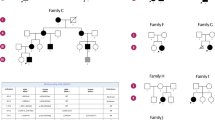Abstract
Machado–Joseph disease (MJD) has been described in Africans, but no cases have been reported from Nigeria. Current MJD global distribution results from both the ancestral populations-of-origin and the founder effects of mutations, some as a consequence of the Portuguese sea travels in the 15th to 16th century. Two main ancestral haplotypes have been identified: the Machado lineage, which is more recent, predominant in families of Portuguese extraction, and the Joseph lineage, which is much older and worldwide spread, postulated to have an Asian origin. We report a Nigerian family with MJD from Calabar, once settled by Portuguese slave traders, and assessed its mutational origin. The proband was a 33-year-old man with progressive unsteady gait, weakness of all limbs, dysphagia, dysarthria, urinary frequency and diaphoresis. He had end-of-gaze nystagmus, spastic quadriparesis and atrophic small muscles of the hand. He showed fibrillation potentials on EMG, and nerve conduction studies suggested a central axonopathy without demyelination. This family bears the Joseph haplotype, which has a founder effect in the island of Flores, in the Azores (and their descendants in North-America), but is also the most common in non-Portuguese populations worldwide, with an estimated mutation age of around 7000 years.
Similar content being viewed by others
Log in or create a free account to read this content
Gain free access to this article, as well as selected content from this journal and more on nature.com
or
References
Coutinho P, Andrade C : Autosomal dominant system degeneration in Portuguese families of the Azores Islands. A new genetic disorder involving cerebellar, pyramidal, extrapyramidal and spinal cord motor functions. Neurology 1978; 28: 703–709.
Lima L, Coutinho P : Clinical criteria for diagnosis of Machado–Joseph disease: report of a non-Azorean Portuguese family. Neurology 1980; 30: 319–322.
Sequeiros J, Martins S, Silveira I : Epidemiology and population genetics of degenerative ataxias. Handb Clin Neurol 2012; 103: 227–251.
Sequeiros J, Coutinho P : Epidemiology and clinical aspects of Machado–Joseph disease. Adv Neurol 1993; 61: 139–153.
Gaspar C, Lopes-Cendes I, Hayes S et al: Ancestral origins of the Machado–Joseph disease mutation: a worldwide haplotype study. Am J Hum Genet 2001; 68: 523–528.
Buhmann C, Bussopulos A, Oechsner M : Dopaminergic response in Parkinsonian phenotype of Machado–Joseph disease. Mov Disord 2003; 18: 219–221.
Martins S, Calafell F, Gaspar C et al: Asian origin for the worldwide-spread mutational event in Machado–Joseph disease. Arch Neurol 2007; 64: 1502–1508.
Martins S, Soong BW, Wong VC et al: Mutational origin of Machado–Joseph disease in the Australian Aboriginal communities of Groote Eylandt and Yirrkala. Arch Neurol 2012; 69: 746–751.
Healton EB, Brust JC, Kerr DL, Resor S, Penn A : Presumably Azorean disease in a presumably non-Portuguese family. Neurology 1980; 30: 1084–1089.
Subramony SH, Hernandez D, Adam A et al: Ethnic differences in the expression of neurodegenerative disease: Machado–Joseph disease in Africans and Caucasians. Mov Disord 2002; 17: 1068–1071.
Lovejoy PE : Historical setting; in Metz HC (ed): Nigeria: A Country Study. Washington: GPO for the Library of Congress, 1991, pp 1–83.
Martins S, Coutinho P, Silveira I et al: Cis-acting factors promoting the CAG intergenerational instability in Machado–Joseph disease. Am J Med Genet B Neuropsychiatr Genet 2008; 147B: 439–446.
Jardim LB, Pereira ML, Silveira I, Ferro A, Sequeiros J, Giugliani R : Neurologic findings in Machado–Joseph disease: relation with disease duration, subtypes, and (CAG)n. Arch Neurol 2001; 58: 899–904.
Hirayama K, Takayanagi T, Nakamura R et al: Spinocerebellar degenerations in Japan: a nationwide epidemiological and clinical study. Acta Neurol Scand Suppl 1994; 153: 1–22.
Yeh TH, Lu CS, Chou YH et al: Autonomic dysfunction in Machado–Joseph disease. Arch Neurol 2005; 62: 630–636.
Acknowledgements
SM is the recipient of a scholarship (SFRH/BPD/77969/2011) from the Portuguese Foundation for Science and Technology (FCT); IPATIMUP is partially supported by FCT. This work was co-financed by the European Social Fund (Human Potential Thematic Operational Programme).
Author information
Authors and Affiliations
Corresponding author
Ethics declarations
Competing interests
The authors declare no conflict of interest.
Rights and permissions
About this article
Cite this article
Ogun, S., Martins, S., Adebayo, P. et al. Machado–Joseph disease in a Nigerian family: mutational origin and review of the literature. Eur J Hum Genet 23, 271–273 (2015). https://doi.org/10.1038/ejhg.2014.77
Received:
Revised:
Accepted:
Published:
Issue date:
DOI: https://doi.org/10.1038/ejhg.2014.77
This article is cited by
-
Machado-Joseph disease in a Sudanese family links East Africa to Portuguese families and allows reestimation of ancestral age of the Machado lineage
Human Genetics (2023)
-
Mutant Ataxin-3–Containing Aggregates (MATAGGs) in Spinocerebellar Ataxia Type 3: Dynamics of the Disorder
Molecular Neurobiology (2021)



